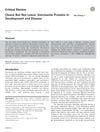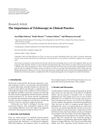 9 citations,
June 2003 in “Veterinary dermatology”
9 citations,
June 2003 in “Veterinary dermatology” Boxer dogs may have a genetic skin condition that worsens seasonally and can be treated with certain medications.
 4 citations,
April 2021 in “Experimental and Molecular Medicine”
4 citations,
April 2021 in “Experimental and Molecular Medicine” The conclusion is that certain genetic factors and blood types may affect COVID-19 severity, but changes in ACE2 and TMPRSS2 genes are not clearly linked to it.
 2 citations,
March 2022 in “Journal of Personalized Medicine”
2 citations,
March 2022 in “Journal of Personalized Medicine” Personalized medicine is important for treating skin disorders, with new treatments and connections to hormones and genetics being explored.
2 citations,
December 2021 in “Dermatology and therapy” Microneedling helps with hair loss, especially with 5% minoxidil, but more high-quality research is needed.
 1 citations,
August 2021 in “Canadian journal of neurological sciences”
1 citations,
August 2021 in “Canadian journal of neurological sciences” Woodhouse-Sakati syndrome can cause writer's cramp and other varied symptoms, highlighting the importance of genetic testing for diagnosis.
 1 citations,
January 2009 in “Elsevier eBooks”
1 citations,
January 2009 in “Elsevier eBooks” Anorexia Nervosa and Bulimia Nervosa are complex eating disorders with increasing incidence among young females, significant morbidity, and varying mortality rates, requiring more research for better treatment.
 December 2024 in “Nutrients”
December 2024 in “Nutrients” Skin, hair, and nail changes can help detect eating disorders early.
 June 2024 in “British Journal of Dermatology”
June 2024 in “British Journal of Dermatology” The grand round helps improve diagnoses and suggests new treatments for hair disorders.
 June 2024 in “British Journal of Dermatology”
June 2024 in “British Journal of Dermatology” The review helps improve diagnosis and treatment of challenging hair disorders.

Thyroid problems can cause hair loss and change hair texture.
 September 2022 in “Frontiers in genetics”
September 2022 in “Frontiers in genetics” A Chinese male with a new genetic mutation has a skin condition and severe urinary issues, with treatments having mixed success.
 September 2022 in “Dermato”
September 2022 in “Dermato” Adult acne is often related to hormonal disorders, especially in women, and may need long-term treatment involving specialists.
 March 2021 in “Research Square (Research Square)”
March 2021 in “Research Square (Research Square)” Patients with RASopathies have a higher risk of autoimmune disorders and should be routinely screened.
 April 2020 in “Journal of evolution of medical and dental sciences”
April 2020 in “Journal of evolution of medical and dental sciences” A one-year-old child with a genetic condition had symptoms improved by treating zinc deficiency.
 April 2020 in “Journal of the Endocrine Society”
April 2020 in “Journal of the Endocrine Society” Non-classic congenital adrenal hyperplasia (NCCAH) can mimic PCOS and requires genetic testing for proper diagnosis and treatment.
 April 2020 in “Journal of the Endocrine Society”
April 2020 in “Journal of the Endocrine Society” A patient with myotonic dystrophy had several autoimmune disorders and thyroid cancer, suggesting a possible link between these conditions.
 July 1980 in “Journal of The American Academy of Dermatology”
July 1980 in “Journal of The American Academy of Dermatology” The conference concluded that understanding hair and nail disorders is important, iron deficiency may be linked to hair loss, and while some treatments for skin conditions are effective, they may have risks and high costs.
September 2022 in “Translational Andrology and Urology” Finasteride may cause lasting sexual and mental health issues, and genetic screening could help prevent them.
December 2021 in “BMJ Open” Androgenetic alopecia in men aged 46 is not significantly linked to depression, anxiety, quality of life, self-esteem, or sexual symptoms.
 432 citations,
April 2014 in “Nature communications”
432 citations,
April 2014 in “Nature communications” A mother's diet at conception can cause lasting genetic changes in her child.
 62 citations,
April 2009 in “British Journal of Dermatology”
62 citations,
April 2009 in “British Journal of Dermatology” Epidermal stem cells could lead to new treatments for skin and hair disorders.
 40 citations,
December 2019 in “Neurobiology of Stress”
40 citations,
December 2019 in “Neurobiology of Stress” Neuroactive steroids show promise for treating mental and neurological disorders by targeting GABA_A receptors.
 17 citations,
August 2015 in “Expert Opinion on Pharmacotherapy”
17 citations,
August 2015 in “Expert Opinion on Pharmacotherapy” The document concludes that oral finasteride and topical minoxidil are effective for genetic hair loss, while other treatments for different types of hair loss show promise but need more research.
 14 citations,
May 2022 in “Asian Journal of Pharmaceutical Sciences”
14 citations,
May 2022 in “Asian Journal of Pharmaceutical Sciences” New hair follicle-targeting treatments show promise for hair disorders but need more research on safety and effectiveness.
 8 citations,
July 2019 in “Pure and Applied Chemistry”
8 citations,
July 2019 in “Pure and Applied Chemistry” Some natural compounds from Iris plants can block enzymes related to certain disorders, with a few affecting both targeted enzymes.
 8 citations,
May 2017 in “IUBMB life”
8 citations,
May 2017 in “IUBMB life” Astrotactin proteins are important for brain and skin development and are linked to several neurodevelopmental disorders.
 7 citations,
January 2013 in “Dermatology Research and Practice”
7 citations,
January 2013 in “Dermatology Research and Practice” Trichoscopy is a valuable tool for diagnosing and managing hair and scalp disorders.
 5 citations,
June 2018 in “Records of Natural Products”
5 citations,
June 2018 in “Records of Natural Products” Garden cress extract may help treat skin inflammation and androgen-related disorders.
 3 citations,
April 2015 in “American journal of biomedical sciences”
3 citations,
April 2015 in “American journal of biomedical sciences” Androgens play a key role in hair growth and disorders like baldness and excessive hairiness.
 2 citations,
February 2023 in “Journal of the American Academy of Dermatology”
2 citations,
February 2023 in “Journal of the American Academy of Dermatology” People with autism are more likely to develop alopecia areata than those without autism.



























